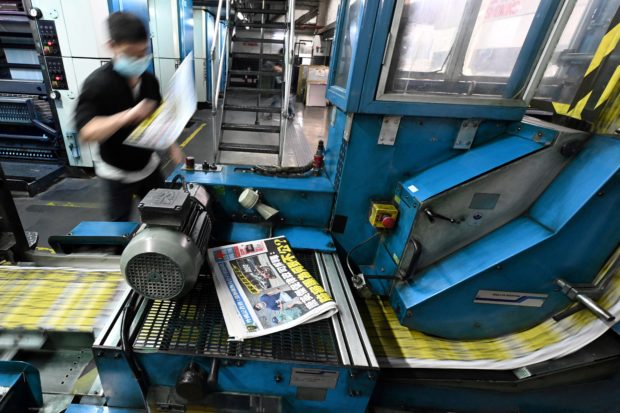
This picture taken on May 11, 2021 shows an employee working at the printing facility of the Apple Daily newspaper in Hong Kong. Hong Kong’s pro-democracy newspaper Apple Daily will print its final edition “no later than Saturday.” Bosses confirmed this after police froze accounts and arrested staff using a new national security law. (File photo by Peter PARKS / AFP)
MANILA, Philippines — Traditional journalism and emerging technologies, such as artificial intelligence (AI), must be integrated to deliver better reporting, the Philippine Press Institute (PPI) said on Thursday.
According to PPI Chairperson and President Rolando Estabillo, print media has been sidetracked by digital media, which offers faster and more current reportage compared to the former.
READ: PPI forum, awards underscore print media values, challenges
This, in turn, caused revenues of print media to drop.
“The current state of print media faces a stark reality. […] The traditional lifelines of print have been declining steadily,” Estabillo said in the 28th National Press Forum of the PPI.
“The digital age has ushered in a new instantaneous 24/7 news cycle, challenging the periodic nature of print media,” he added.
The official likewise said that AI can assist in journalism.
“AI has profound tools for journalism. Tools like GPT […] likewise have the capability to drop articles, but similarly, those involving straightforward reporting from structured data,” Estabillo said.
“This system can also help in brainstorming ideas or stories or even generating interview questions which can be refined by human journalists,” he noted.
READ: AI: a double-edged sword
“However, generative AI also poses risks, notably in the area of deepfakes or fake news, or the creation of completely fabricated news stories,” he cautioned.
“It is imperative that the journalism industry develop robust verification and fact-checking mechanisms to combat these,” he said.
Estabillo then suggested that for print media to survive, it should allow the use of technologies but still hold firm to its ethical standards.
“While the challenges facing the print media are significant, they are not insurmountable,” he said.
“By leveraging the strength of both traditional journalism and innovative technologies like AI, and by ensuring that ethical standards guide technological advancements, print media can continue to play a crucial role in our society,” he concluded.